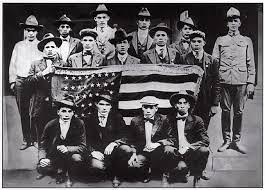In 1941, against the backdrop of World War II and the escalating conflict in the Pacific theater, the United States Marine Corps recruited the first Navajo code talkers to serve as crucial assets in the war effort. The Navajo code talkers were a group of Native American Marines who played a vital role in developing and implementing a secret code based on their native language, which proved to be unbreakable by enemy forces. The recruitment of the Navajo code talkers marked a significant moment in military history, as their innovative use of a complex and secure code helped secure communications and intelligence during some of the most critical and dangerous battles of the war. The idea to use the Navajo language as a code for secure communications originated from Philip Johnston, a World War I veteran who was raised on the Navajo reservation and was fluent in the Navajo language. Recognizing the complexity and uniqueness of the Navajo language, Johnston proposed the idea of using Navajo speakers as codetalkers to create an unbreakable code that could be used to transmit sensitive information on the battlefield. The Marine Corps saw the potential value of this idea and began recruiting Navajo volunteers to undergo rigorous training and serve as codetalkers in combat zones. The first group of Navajo code talkers was recruited in 1942, and they underwent intensive training in coding, encryption, and radio communications to prepare them for their critical role in the war. The Navajo language, with its complex syntax, tonal qualities, and lack of a written alphabet, proved to be an ideal basis for a secret code that would be virtually impossible for enemy forces to decipher. The code talkers developed a system of using Navajo words to represent military terms, locations, and commands, creating a secure and efficient means of communication that could be used in combat situations where speed and accuracy were paramount. The Navajo code talkers were deployed to the Pacific theater, where they served in some of the most intense and dangerous battles of the war, including the campaigns in Guadalcanal, Tarawa, Saipan, and Iwo Jima. Their role was to transmit and receive coded messages over radio communications, relaying critical information about troop movements, enemy positions, and tactical objectives to commanders and fellow Marines. The Navajo code talkers operated under extreme conditions, often under fire and in close proximity to enemy forces, demonstrating courage, skill, and dedication in carrying out their duties. The Navajo code proved to be a highly effective and secure means of communication, confounding enemy codebreakers who were unable to decipher the complex and cryptic messages transmitted by the code talkers. The Navajo language, with its intricate grammar and unique vocabulary, provided a level of security and encryption that was unmatched by conventional codes and ciphers, allowing the code talkers to play a critical role in ensuring the success of American military operations in the Pacific. The contributions of the Navajo code talkers were instrumental in helping the United States achieve victory in the Pacific theater and turn the tide of the war against the Axis powers. Their bravery, ingenuity, and skill in developing and using a secure code under combat conditions saved countless lives and provided a crucial advantage to American forces in some of the most challenging and decisive battles of World War II. The Navajo code talkers' legacy remains a testament to the resilience, resourcefulness, and patriotism of Native American servicemembers who served their country with honor and distinction during a time of great peril and sacrifice.
1 May 1941 The first Navajo code talkers are recruited by the US Marines.
